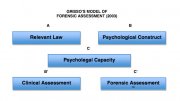
Pursuing a career in forensic psychology can be an exciting way to enter the field of forensics for someone who has an undergraduate background in psychology. A forensic psychologist is someone who uses their training in psychology, including evaluation, diagnosis, and treatment, to work within some aspect of the criminal justice system. A forensic psychologist could be a therapist in a prison, an expert witness in court, a criminal profiler, or any combination of those.
While forensic psychologists must have graduate level training, they do not necessarily have to study in a forensic psychology master’s or doctorate program. Those that choose to seek a master’s degree in forensic psychology should consider the necessary prerequisites for this type of program, the types of courses they might end up taking, and how they would like to pursue this advanced degree.
Prerequisites for a Master’s Degree in Forensic Psychology
As with any master’s degree program, any student wishing to apply to forensic psychology masters programs must have completed, or be on track to complete, an undergraduate degree. Most programs do not require that degree to be in forensic psychology, or in psychology at all. However, certain courses are usually required, such as Statistics and introductory level courses to psychology and to experimentation. For promising candidates, many schools exercise the option to grant conditional admission for students that have not completed all requisite courses, provided they can complete them within their first semester of the graduate program.
Many selective programs also have a minimum GPA for applicants to their graduate level programs. This helps narrow the applicant field to those who have proven they can function successfully at an institute of higher learning. Most master’s degree programs also require applicants take the GRE and may have established minimum scores for admission.
Applicants should always keep in mind the requirements for individual programs can vary greatly and be sure to check with a program before applying.
Common Courses & Electives
Every curriculum is different, but some generalizations can be made about the standard courses required for a master’s degree in forensic psychology. Once prerequisites have been met, students can begin to take advanced courses in psychology, including general courses in research, psychopathology, and advanced statistics.
When some basic advanced requirements have been met, students can begin to explore courses that focus on the forensic aspect of the forensic psychology master’s degree. While these courses can vary at different schools, they may include such course titles as:
- Psychology of Criminal Behavior
- Victimology
- Mental Health Issues in Policing
- Terrorism
- Violence and Aggression
- Evaluation and Treatment of Juvenile Offenders
This is not an exhaustive list, only a sampling of the kinds of courses found in the course catalogs for forensic psychology master’s degree programs.
Source: www.forensicscolleges.com
You might also like:
























 Texas is the second most populous and the second most extensive of the 50 United States, and the most extensive state of the 48 contiguous United States. The name, based on the Caddo word tejas meaning "friends" or "allies", was applied by the Spanish to the Caddo...
Texas is the second most populous and the second most extensive of the 50 United States, and the most extensive state of the 48 contiguous United States. The name, based on the Caddo word tejas meaning "friends" or "allies", was applied by the Spanish to the Caddo...
 The Texas House of Representatives is the lower house of the Texas Legislature. The House is composed of 150 members elected from single-member districts across the state. The average district has about 150,000 people. Texas House elections are held every two years...
The Texas House of Representatives is the lower house of the Texas Legislature. The House is composed of 150 members elected from single-member districts across the state. The average district has about 150,000 people. Texas House elections are held every two years...
Usually, you can only refer to yourself as a psychologist (of any kind) if you are licensed. The rules about licenses vary from state to state. There are only a few states where you can get licensed as a psychologist with a master's degree. So in most places, you probably would not be known as a forensic psychologist.